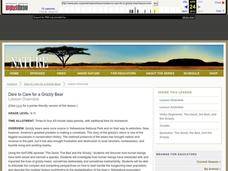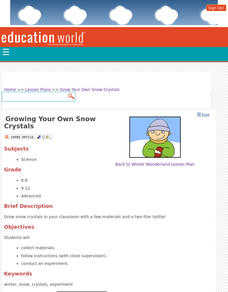Curated OER
Feeling Hot, Hot, Hot!
Students study the different types of volcanoes and how they erupt. In this volcano lesson students identify where volcanoes are most prevalent and options for predicting eruptions.
Curated OER
Naturral Born Robots: Robots Have Feelings Too
Students explore robotics. They design a simple device that simulates a human arm lifting a mass. Students test the strength of their arm. Students discuss artificial intelligence.
Curated OER
Boomerangs Keep Coming Back
Students investigate the flight of paper boomerangs. In this flight lesson, students examine the flight variables of paper boomerangs, which they make, by investigating the concepts of lift and drag. They examine what happens when an...
Curated OER
Designing Babies
High schoolers analyze current and emerging techniques used to select specific characteristics in offspring. They examine specific case studies and make ethical decisions based upon the Ethical Decision-Making Model.
Curated OER
Controlling Flight: Rudders, Ailerons, and Elevators
Fifth graders create paper gliders and check for flight distance and time. In this flight lesson, 5th graders create a paper glider from the attached worksheet and adjust the rudder, aileron, and elevator. They see how these adjustments...
Curated OER
Bandhavgarh: The Tiger's Domain
Students research Bandhavgarh, India in order to create a project that educates people about the area and the royal Bengal tigers that roam freely amongst the ruins of temples and palaces of the once powerful dynasty.
Curated OER
From Wolf to Dog
Students explain how dogs evolved from wolves based on the video. In this biology lesson, students research about breeding animals for specific traits. They interview dog owners and create a presentation about the dog.
Curated OER
Cheetah Challenges
Students research the problems that cheetahs are facing in the wild. In this biology lesson, students discuss how animal rehabilitation works. They write blogs about it and comment on everyone's post.
Curated OER
Dare to Care for a Grizzly Bear
Students examine the relationship between humans and grizzly bears. In this biology lesson plan, students research about the bear's habits and living environment. They write a letter to the US Fish and Wildlife Service petitioning them...
Curated OER
Growing Your Own Snow Crystals
Students grow snow crystals in your classroom with a few materials and a two-liter bottle!
Curated OER
Electronic Components
Students review new terminology and computer circuits and the value of a resistor. They complete three experiments, "Resistance Activities," Transistor Activities,"Diode Activities" and enter data, results and their findings on Student...
Curated OER
DIY Lava Lamp
Students examine lava lamps and what causes them to work. In this density lesson students make a lava lamp and write the scientific explanation of what happens.
Curated OER
Modern Physics
In this physics worksheet, students tackle the hard questions about scientific theory and take a look at the First and Second Laws of Thermodynamics.
Michigan Sea Grant
Fish Identification
Using a dichotomous key, pupils identify characteristics of fish who live in the Great Lakes and explain how these features help them survive. In small groups, class members discover what features scientists consider important and...
Curated OER
Burn, Baby Burn (Or Not)
Physics learners apply the concepts of fluid pressure input and output to firefighting. Divide your class into small groups and give them each a few cards that list nozzle type, hose length, hose size, and structure dimensions, They are...
Curated OER
Kingdom Animalia ~ A Look at the Five Major Classes
Biological taxonomy masters examine the five main classes under phylum chordata. Pupils compare and contrast the identifying characteristics of the various organisms. They explain why taxonomy is important in classifying organisms. You...
Curated OER
Introduction to Antibiotics
High schoolers describe the impact of antibiotics on disease. They describe what infections antibiotics are useful for. Students are introduced to the idea of antibiotic resistance as a way to focus on antibiotics and the mechanisms by...
Curated OER
The Three Gorges: Should Nature or Technology Reign?
Students examine the construction of the Three Gorges Dam in China. In this Three Gorges Dam lesson, students research Internet sources pertaining to the dam. Students discuss the geography and culture of East China as they prepare for...
Curated OER
Deadly Disease among Us
Students recognize that infectious diseases are a continuing problem among all human populations. They define and give examples of emerging infectious diseases. Students define and give examples of re-emerging infectious diseases.
Curated OER
The History of Religion
Young scholars learn about the two main types of religions. For this religion lesson, students define religion and learn about early religion as well as religion in the west. Young scholars define animism, polytheism,...
Curated OER
Painting - Science Integration - Ponds - Monet - Painting
First graders identify Monet as an Impressionist artist. They create impressions of trees and bushes, paint with sponges, and mix tints and shades. They create impressions of flowers with q-tip dabbing and mixing tints and shades.
Channel Islands Film
Human Impact on the Food Web of Santa Cruz Island
What happens when a non-native species is introduced onto an island? Santa Cruz Island, part of the Channel Island chain located off the coast of southern California, provides the perfect laboratory for young environmental scientists to...
Channel Islands Film
Arlington Springs Man: Lesson Plan 4
West of the West's documentary Arlington Springs Man introduces viewers to the remarkable finds on Santa Rosa Island. Archaeologist have discovered on this small island that is part of the Channel island chain, human and pygmy mammoth...
Channel Islands Film
Island Rotation: Lesson Plan 2
Why are Torrey pines only found in La Jolla, California and on Santa Rosa Island? Class members examine images of Torrey pines from these two locations, noting the similarities and differences, and then develop a demonstration model that...

























